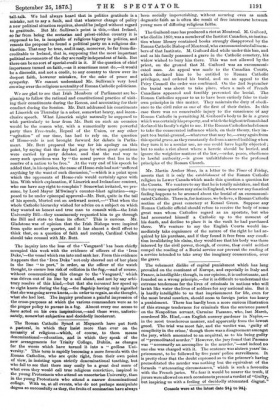The rather sensational and probably ill-considered proposal of Lord Mayor
1PSwiney to set up a new political party on the basis of the cry, "Faith and Fatherland," has elicited from Mr. Sullivan, as one of the Parliamentary leaders of the Home-rule party, a rather skilful letter to Thursday's Times, in which he makes capital out of what he regards as the notorious failure of the new programme, and declares that " the stormiest passions of the Irish Catholic population have been evoked by the mons- trous suggestion ; that every organ of Catholic opinion in our- country has execrated it ; that it is denounced as a base ingratitude againat our Protestant fellow-countrymen, a great treason against the nation." Probably this very strong language is only tall-talk. We had always beard that in politics gratitude is a mistake, not to say a fault, and that whatever change of policy a new political situation requires, should be judged without regard to gratitude. But Mr. Sullivan's point is this,—that Ireland, se far from being the sectarian and priest-ridden country it is supposed to be, is incapable of religious bigotry in politics, and resents the proposal to found a political party on a religious dis_ tinctien. That may be true, and it may, moreover, be far from dis- creditable to Ireland, that is, supposing that the most important political movements of the day are really independent of faith. But there can be no sort of special credit in it. If the question of chief importance;turned an faith,—as it sometimes must do,—it would be a discredit, and not a credit, to any country to throw over its deepest faith, however mistaken, for the sake of peace and sympathy. We cannot understand Mr. Sullivan's very loud crowing over the religious neutrality of Roman Catholic politicians.































 Previous page
Previous page